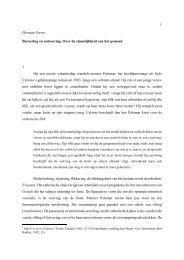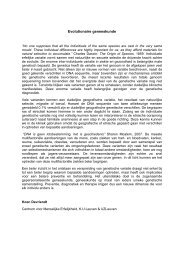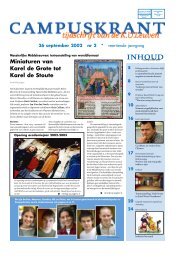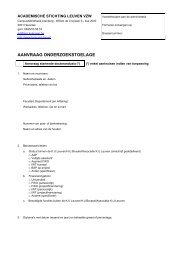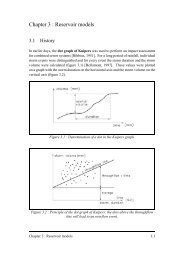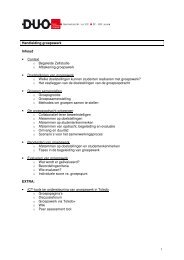EQUALITY GUIdE - KU Leuven
EQUALITY GUIdE - KU Leuven
EQUALITY GUIdE - KU Leuven
You also want an ePaper? Increase the reach of your titles
YUMPU automatically turns print PDFs into web optimized ePapers that Google loves.
Chapter 5 ! Mentoring 249<br />
fact that there was a limited number of Faculties/Departments, the latter criterion was<br />
difficult to realize for all matches.<br />
The argument against single-department mentoring is the fear of favouritism. Favouritism<br />
refers to the mentor’s ability to intervene on the mentee’s behalf and provide exposure<br />
and protection. Another argument for cross-department duos is the assumption<br />
that a mentor from a different field of expertise may be better able to give advice on<br />
difficult relationships than people who already have their own views on the protagonists.<br />
Thirdly, a cross-departmental approach provides a wider perspective and opens<br />
up broader and different networks and skills. Although these arguments seem defensible,<br />
the good practice in the pilot project at UHasselt gave no evidence. There were<br />
extremely good mentoring relations across one specific department. A counter-argument<br />
could be that the knowledge and experience of the mentor within the specific<br />
academic and scientific field/department is of great importance. And last but not least,<br />
protection and sponsorship is something the university (and steering committee/mentors/mentees)<br />
wants to avoid. The programme is strongly based on self-reliance<br />
and pro-activity of mentees.<br />
The mentees were notified by e-mail with a proposition of their mentor in the programme.<br />
They were asked to react if they did not agree with the match. They also got<br />
the assurance that all relationships were probationary for the first meeting with their<br />
proposed mentor. One of the mentees asked for another mentor because the proposed<br />
mentor appeared to be the father of her best friend. As a result of this personal reason<br />
the proposed duos changed.<br />
From this pilot can be concluded that good practice appears to be that mentees are<br />
guided in their selection, but left to make up their own minds.<br />
3.4.4. Training<br />
Literature, case studies and good practice on mentoring unanimously state that ‘training<br />
is essential and one of the key processes’.<br />
Together versus apart<br />
Mentors and mentees are often trained together to prepare them for the programme.<br />
This is based on the idea that mentor and mentee are involved in a long-term programme<br />
(at least one year) of which the joint training is a first explanation on how and<br />
on which issues the duos are going to work together. However, at UHasselt the programme<br />
took place in a six-month period. The starting point here was that the mentee<br />
would shape the relationship in the sense that she had to decide which topics she<br />
wanted to work on with the mentor. Because of the specific role of the mentees, they<br />
were trained separately from the mentors.<br />
There was also a mentor meeting at the start of the programme. The aim of this meeting<br />
was to make mentors aware of the importance of development programmes for



